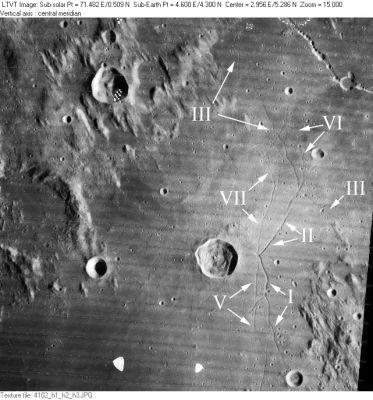Difference between revisions of "Rimae Triesnecker"
| Line 6: | Line 6: | ||
|} | |} | ||
<div id="toc"> | <div id="toc"> | ||
| − | [http://www.lpod.org/coppermine/displayimage.php?pid=3005&fullsize=1 [[Image: | + | [http://www.lpod.org/coppermine/displayimage.php?pid=3005&fullsize=1 [[Image:Normal_Rimae_Triesnecker-LO-IV-102H_LTVT.JPG|external image normal_Rimae_Triesnecker-LO-IV-102H_LTVT.JPG]]]<br /> ''[http://lpod.org/coppermine/displayimage.php?pos=-3005 LO-IV-102H]'' [[Triesnecker|Triesnecker]] is the isolated 26-km polygonal crater to the lower right of center. To its west is the deeply shadowed circular 13-km [[Chladni|Chladni]], and beyond that 57-km [[Murchison|Murchison]]. In the upper left is 23-km [[Ukert|Ukert]], and in the upper right 9-km [[Hyginus|Hyginus]] with the prominent crater chain/rille [[Rima%20Hyginus|Rima Hyginus]] passing through it. '''Rimae Triesnecker''' is the name used to designate a series of rilles generally to the east of [[Triesnecker|Triesnecker]], which had several Roman-numeralled segments in the IAU nomenclature of ''[[Named%20Lunar%20Formations|Named Lunar Formations]]'' and the later ''[[System%20of%20Lunar%20Craters|System of Lunar Craters]]'', from which these identifications are copied. Note that '''Rimae Triesnecker VI''' is a somewhat broader rille only marginally visible in this [[Lunar%20Orbiter|Lunar Orbiter]] view. It is seen better at [http://lpod.org/coppermine/displayimage.php?pos=-404 lower sun angles], and should not be confused with the skinnier but more prominent unnumbered north-south rille to its west.<br /> <br /> |
==Images== | ==Images== | ||
[http://www.lpod.org/coppermine/thumbnails.php?album=search&type=full&search=Rimae%20Triesnecker LPOD Photo Gallery] [http://www.lpi.usra.edu/resources/lunar_orbiter/bin/srch_nam.shtml?Rimae%20Triesnecker%7C0 Lunar Orbiter Images] [http://www.lpi.usra.edu/resources/apollo/search/feature/?feature=Triesnecker Apollo Images]<br /> | [http://www.lpod.org/coppermine/thumbnails.php?album=search&type=full&search=Rimae%20Triesnecker LPOD Photo Gallery] [http://www.lpi.usra.edu/resources/lunar_orbiter/bin/srch_nam.shtml?Rimae%20Triesnecker%7C0 Lunar Orbiter Images] [http://www.lpi.usra.edu/resources/apollo/search/feature/?feature=Triesnecker Apollo Images]<br /> | ||
Latest revision as of 02:12, 16 April 2018
Contents
Rimae Triesnecker
|
Lat: 4.3°N, Long: 4.6°E, Length: 215 km, Depth: km, Rükl: 33 |
LO-IV-102H Triesnecker is the isolated 26-km polygonal crater to the lower right of center. To its west is the deeply shadowed circular 13-km Chladni, and beyond that 57-km Murchison. In the upper left is 23-km Ukert, and in the upper right 9-km Hyginus with the prominent crater chain/rille Rima Hyginus passing through it. Rimae Triesnecker is the name used to designate a series of rilles generally to the east of Triesnecker, which had several Roman-numeralled segments in the IAU nomenclature of Named Lunar Formations and the later System of Lunar Craters, from which these identifications are copied. Note that Rimae Triesnecker VI is a somewhat broader rille only marginally visible in this Lunar Orbiter view. It is seen better at lower sun angles, and should not be confused with the skinnier but more prominent unnumbered north-south rille to its west.
Images
LPOD Photo Gallery Lunar Orbiter Images Apollo Images
- Frame 2092, made by Lunar Orbiter 2, shows a close-up of Rimae Triesnecker's central area; immediately east of Triesnecker itself. Research Danny Caes.
Maps
(LAC zone 59C1) LAC map Geologic map AIC map
Description
Description: Wikipedia
Additional Information
Rimae Triesnecker is a well-known system among dedicated observers of the moon. It's the perfect test-object for those who want to know if their telescope is capable of showing the whole system during ideal conditions of seeing and illumination (during local post-sunrise or pre-sunset circumstances). - DannyCaes Dec 25, 2017
Nomenclature
- Named after the nearby crater. (Triesnecker)
- The original IAU nomenclature of Blagg and Müller (1935) apparently included six Roman-numeraled rilles named after Triesnecker.
- The System of Lunar Craters seems to have deleted Triesnecker IV (which referred to the separate segment of rille at the tip of the uppermost "III" arrow in the above image) and added Triesnecker VII (which was perhaps regarded as a part of V in the original nomenclature).
- In 1973, the IAU declared its intention that "Rimae and Rima systems will receive new and more appropriate designations," however no action on this resolution seems ever to have been taken. As a result, in the IAU Planetary Gazetteer (beginning with the printed version) simply lumps the groups of Roman-numeraled rilles together as a "rimae" with a rough indication of the area in which they fall. It is unclear if the old Roman-numeraled designations remain approved designations of individual rilles pending the formulation of the "new and more appropriate designations".
- In the south (below the tips of the lowermost arrows), Triesnecker V is intersected by what was known as Rima Rhaeticus I in the System of Lunar Craters. It might be thought of as a fork of Triesnecker I and continues south across the margin of the frame. There seem to no longer be any rilles associated with Rhaeticus in the IAU nomenclature (there were originally four), and the segment shown here falls within the circle of Rimae Triesnecker defined by the position and diameter given in the on-line IAU Planetary Gazetteer. So perhaps it is now thought of as a part Rimae Triesnecker?
LPOD Articles
Continuing East. 100 Minute Drawing Triesnecker Rilles Troughful Magnificence
Lunar 100
L35: Rille family.
Bibliography
Wood, C.A. 9/1/2006. Moons Mystery Rilles. S&T 112(3):54-55
